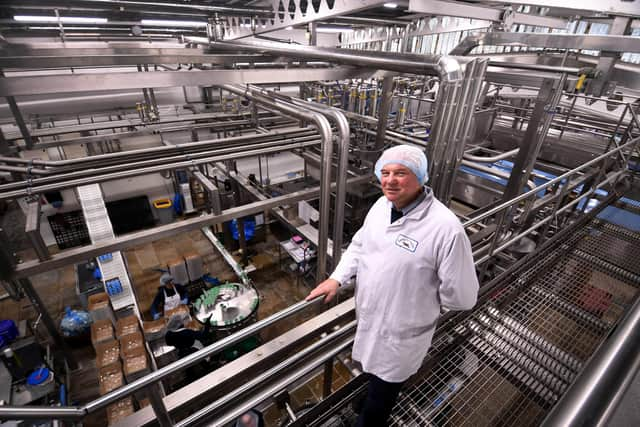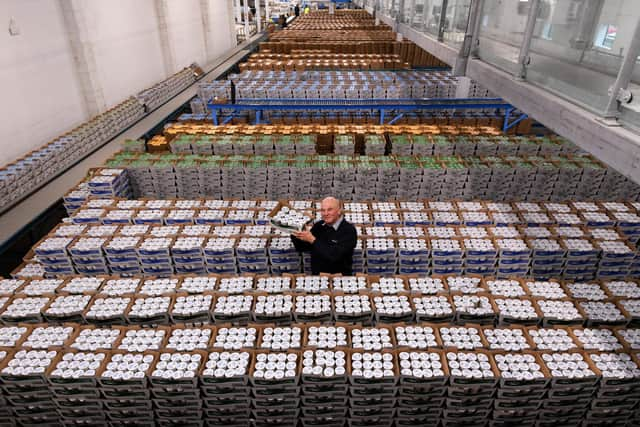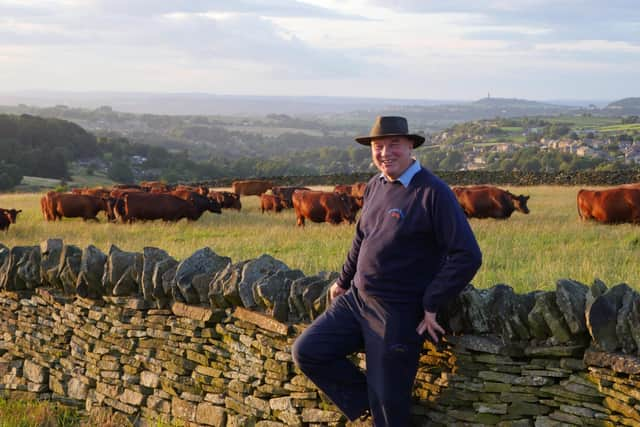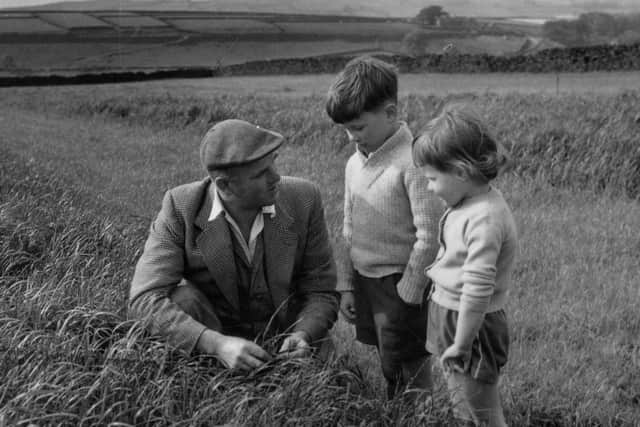Longley Farm: 75 years of Yorkshire family-run dairy business that now has farm in Australia
These days and for much of the past 30 years the dairy business they started as J&E Dickinson has become better known by its Longley Farm brand range, but while the farming side now makes up only a small proportion of overall turnover, the commitment is as strong as it has ever been, and not just in Yorkshire or even the UK.
There will be many who may not even know Longley Farm is a Yorkshire-based farming business yet purchase, double cream, yogurt, butter and cottage cheese and others unaware of its Holmfirth base.
Advertisement
Hide AdAdvertisement
Hide AdJimmy Dickinson, who took over management of the business from his father and uncle in the mid-1990s and is particularly proud of it only ever having been run by the three of them reveals, for the first time publicly, how Longley has become a worldwide concern.


“It will be news to many that we have a 500-acre dairy farm with Jersey cows in Uruguay, a farm in Australia that has Red Poll cattle and that we had one in Estonia, with production in all three countries of Longley Farm products under names Campo Longley in Uruguay, Farmi in Estonia and Richmond Dairies in Australia.
“We are in Uruguay’s top five Jersey herds and sixty per cent of all Longley Farm trade is overseas. Setting up outside of the UK was the only way I could see us expanding our market.
“In this country we have two farms we’ve had for many years. Longley Farm is a modest 100-acres at Holmfirth, roughly 1000ft above sea level; Tyers Hall near Barnsley runs to 830 acres.
Advertisement
Hide AdAdvertisement
Hide AdJimmy credits his father and uncle with their forward-thinking approach, something he has also pursued.


“Between 1948-1954 Longley was a Pennine farm specialising in farm-bottled tuberculosis free milk. When rationing ended in 1954 you were allowed to sell cream for the first time in fifteen years. They started immediately and it skyrocketed. We were also one of the first to make yogurt in the late 60s.
“Around 1972-73 my father, who had been in the Pacific with the navy and had spent time with the American fleet, had been inspired by having seen ice cream dispensers and cottage cheese on-board their ships, and he subsequently visited America and on coming back we became the first in the UK to make cottage cheese commercially. In 1973-74 we then bought Tyers Hall Farm, then just 130 acres, to develop our pedigree Jersey herd.
Jimmy had studied engineering and thermodynamics at Selwyn College, Cambridge; had worked in engineering on turbines, diesel engines and pumps, sometimes on land or on-board ship in such far-flung places as Africa, France, Jordan and Skegness, he smiles at the latter reference.
Advertisement
Hide AdAdvertisement
Hide Ad“I initially resisted joining my father and uncle, but in the mid-80s I went to Manchester Business School and did an MBA studying the dairy industry. During that time I was inspired as to what I could do.


“I spent 18 months looking at how to freeze cream, for export. Our technology for freezing cream is still the world leader today. I did all the marketing, my father and uncle made it, and then I developed the export business independently.
“The first market I targeted was Japan. Ten years later we were the biggest deep-sea exporters of frozen food from the UK.
“My logic was that even by the 1980s it was pretty obvious that the British market was and still is too small even for a business of our size. Our market is defined by the number of customers not consumers, and the number of customers is too small.
Advertisement
Hide AdAdvertisement
Hide Ad“So, if you don’t want to stagnate as a business all you can really do is go international, which is what we did, using the same cow logo and a name that fits for each area.


In the mid-90s Jimmy set up manufacturing bases and farms around the world.
“I wanted somewhere outside the European Union and picked on Estonia and the Southern Hemisphere. By 1996 I ended up running an export business, dairies in Estonia and Australia - and that’s when my father and uncle decided to retire!
“It was all done very seamlessly, no family fallouts. I ended up run off my feet and over time amalgamated the export side with the rest of Longley’s operations and subsequently set up a business in Uruguay where we now have the farm. I now claim we are the country’s only British-owned multi-national dairy business, albeit in a modest way.
Advertisement
Hide AdAdvertisement
Hide Ad“The reason we no longer have Farmi is our market was initially Russia and when Estonia joined the EU Russia banned Estonian produce. The Estonian market on its own brought the same problems as the UK, plus cultural differences.
While continuing to grow the international trade Jimmy has found himself increasingly involved with farming back in Yorkshire.
“I’ve never been as interested as now, particularly with climate change and regenerative agriculture.
“We haul milk in from 29 farms and just under half the milk is from registered Jersey herds. We keep all the Jersey milk separate so that when we say it is Jersey butter it really is.
Advertisement
Hide AdAdvertisement
Hide Ad“We have Red Poll cattle, which I got interested in a few years ago. They come from Tyers to Longley in spring. They fit with my movement towards what is now termed regenerative agriculture but wasn’t when I started. I had read one of John Selwyn Gummer’s documents on climate change. We are now aiming at 20 per cent of our land in some form of biodiversity such as hedges, shelter belts, ponds and woodlands.
“Red Polls are versatile, good at cleaning up areas and love blackberry bushes, bilberries and heather. They are also good for herbal leys that we use for nitrogen and the cattle put their manure back into the soil. We’re minimising fertiliser usage and this year we have not used any bagged fertiliser.
Jimmy says Jersey cows are still important to the business.
“When we started making yogurt we realised high protein milk was important and switched to mainly Jerseys. We have only ever used Jersey bulls. The herd is on the increase through farm manager Paul Robson and his team. We are milking 150 but are aiming to get to 200 milkers.
Jimmy says he is not worried about having good people to follow on after him.
Advertisement
Hide AdAdvertisement
Hide Ad“I have two sons, David and Alex. It’s not exactly clear how they may be involved as yet, but equally I’m not thinking of retiring just yet. David runs the Uruguay business and is currently working on a protein supplement made in our factory in Australia. Alex runs a property business in Bristol and Toulouse.
The Dickinsons remain as forward-thinking as ever.